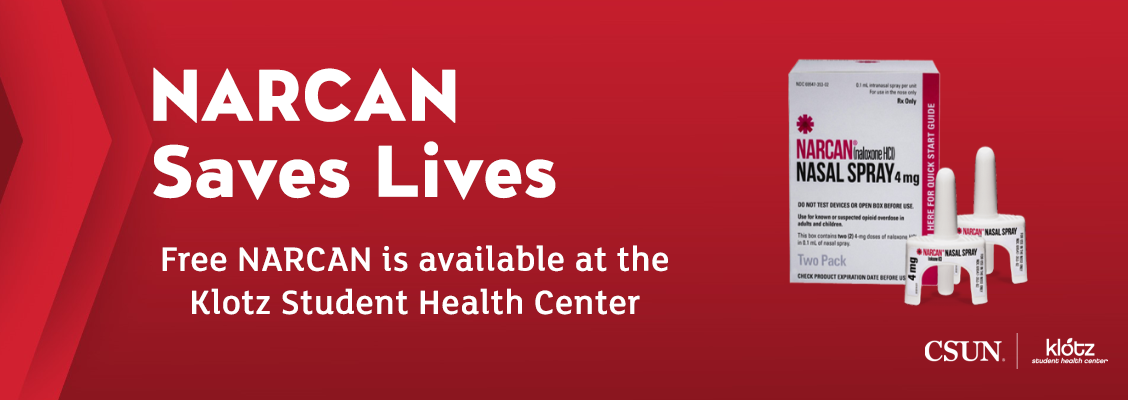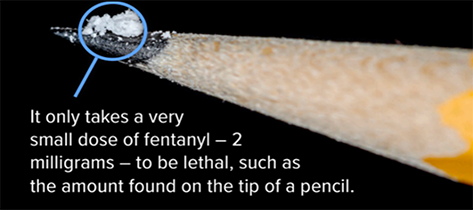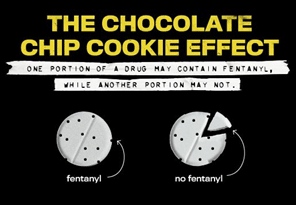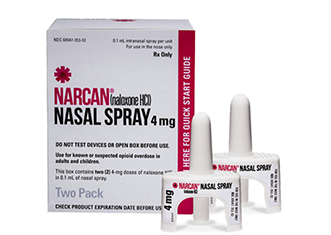
The Klotz Student Health Center now offers free NARCAN (naloxone), a federally approved opioid overdose reversal medication, to currently enrolled CSUN students in recognition of the 2022 California Senate Bill 367: Student safety: opioid overdose reversal medication.
Opioids
Opioids are chemicals designed to reduce pain. Types of opioids include heroin, morphine, fentanyl, Vicodin, and Oxycontin.
Opioid pain relievers are generally safe when taken as prescribed. However, opioids can be misused which means they’re taken in a different way or quantity than prescribed, or taken without a prescription. Regular use—even as prescribed—can lead to dependence and, when misused, opioid pain relievers can lead to addiction, overdose, and death.
Fentanyl

Fentanyl is a synthetic opioid that is up to 50 times stronger than heroin and 100 times stronger than morphine. It is highly addictive and very easily can lead to overdose. Fentanyl is manufactured as both a pharmaceutical drug and an illicit drug. Fentanyl is often mixed or "cut" into opioids such as heroin and counterfeit prescription drugs. More recently, it has been increasingly mixed into other non-opioid drugs such as Adderall, ecstasy/molly, cocaine, methamphetamine, and even cannabis. This makes the risk of accidentally ingesting Fentanyl much higher.
Deaths due to opioid overdoses are on the rise. Most of the recent overdose deaths have been due to synthetic opioids such as fentanyl. Fentanyl can be fatal in very small doses. Drugs can contain fentanyl and you wouldn’t be able to taste, smell, or see it. Just 2 milligrams, or the equivalent of a few grains of salt, may be enough to be lethal.
Fentanyl Test Strips
Fentanyl test strips (FTS) are a low-cost method of helping prevent drug overdoses and reducing harm associated with drug use. FTS are small strips of paper that can detect the presence of fentanyl in different kinds of drugs (cocaine, methamphetamine, heroin, etc.) and drug forms (pills, powder, and injectables). FTS provide people who use drugs and communities with important information about fentanyl in the illicit drug supply so they can take steps to reduce risk of overdose. This CDPH Fentanyl Test Strips to Prevent Overdose Fact Sheet contains additional information about FTS and purchasing options.
Fentanyl test strips are not 100% accurate, A negative test does not guarantee that drugs are "safe." For more information on test strip accuracy and limitations, please see: CDPH Fentanyl and Fentanyl Test Strips Frequently Asked Questions (FAQs).

Sources:
CDC Fentanyl Test Strips: A Harm Reduction Strategy
CDPH Fentanyl Testing To Prevent Overdose
California State University Chico Wellcat Prevention Fentanyl
Naloxone and NARCAN

Naloxone is a medication that can be used in emergency situations when an opioid overdose is suspected. Naloxone is a medication that rapidly reverses an opioid overdose.
Naloxone is the generic form of the medication; NARCAN is a brand name for naloxone just as Tylenol is a brand name for the generic medication acetaminophen. Naloxone is available as a nasal spray or an injection. NARCAN is contained in a small white device about two inches long. The device is used to deliver a spray into the nose. Each device is considered a dose and each box contains two devices.
How to Get Free NARCAN or Fentanyl Test Strips on Campus
Students who would like free NARCAN Nasal Spray or fentanyl test strips must complete training. Upon successful completion of the training, students will pick up their requested products at the Klotz Student Health Center Pharmacy.
To complete the online, self-paced training, students will click on the following link:
Training takes 10-15 minutes to complete. Upon completion, students will receive information on how to pick up their NARCAN and/or fentanyl test strips. If you do NOT receive an email with pickup instructions within one business day of completing the training please contact Valerie.Ipatzi@csun.edu.
Support Resources
Campus resources include:
University Counseling Services (UCS)
(818) 677-2366
UCS staff provide support to students who feel challenged by substance use, theirs or someone else’s, including referrals to treatment beyond the scope of UCS’ services, and support to those students re-entering campus following treatment.
- UCS Alcohol and Other Drug Counseling
For students who would like to speak with an alcohol and other drug specialist, students should request an appointment with Dr. Steve Silver, Psychologist and Alcohol and Other Drugs Counselor at UCS (818) 677-2366.
Klotz Student Health Center
(818) 677-3666
- Klotz Student Health Center Matadors4Wellness Peer Education Program
(818) 677-3685
Educational workshops available for classrooms and organizations.
Community Support Programs
12-step programs provide support for addiction recovery:
Narcotics Anonymous
(818) 773-9999
Community Treatment Programs
Local treatment centers include:
Los Angeles County Department of Health Services, Substance Abuse Prevention & Control
(844) 804-7500
Cri-Help (fee for service)
(818) 985-8323
Tarzana Treatment Centers (fee for service)
(818) 996-1051
National Treatment Locator
The Substance Abuse and Mental Health Services Administration (SAMHSA) maintains a Behavioral Health Treatment Services Locator, a confidential and anonymous source of information for persons seeking treatment facilities in the United States or U.S. Territories for substance use/addiction and/or mental health problems.
Learn More
Here are a few resources where you can learn more about this topic.
- Centers for Disease Control (CDC):
- National Institute on Drug Abuse (NIDA): Naloxone Drug Facts
- California Department of Public Health (CDPH): Stop Opioid Overdose with Naloxone
- NARCAN Manufacturer Website: NARCAN Nasal Spray

